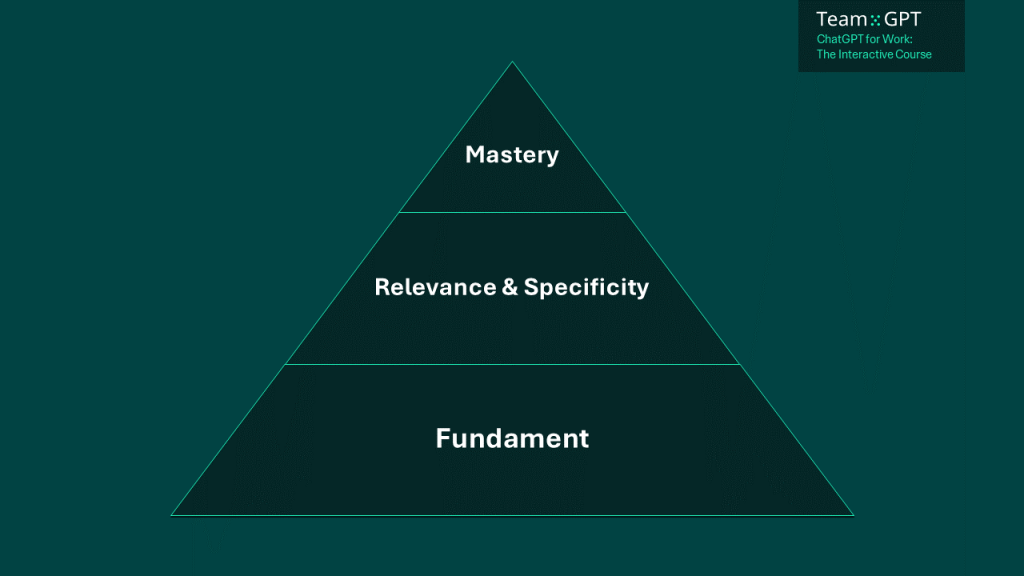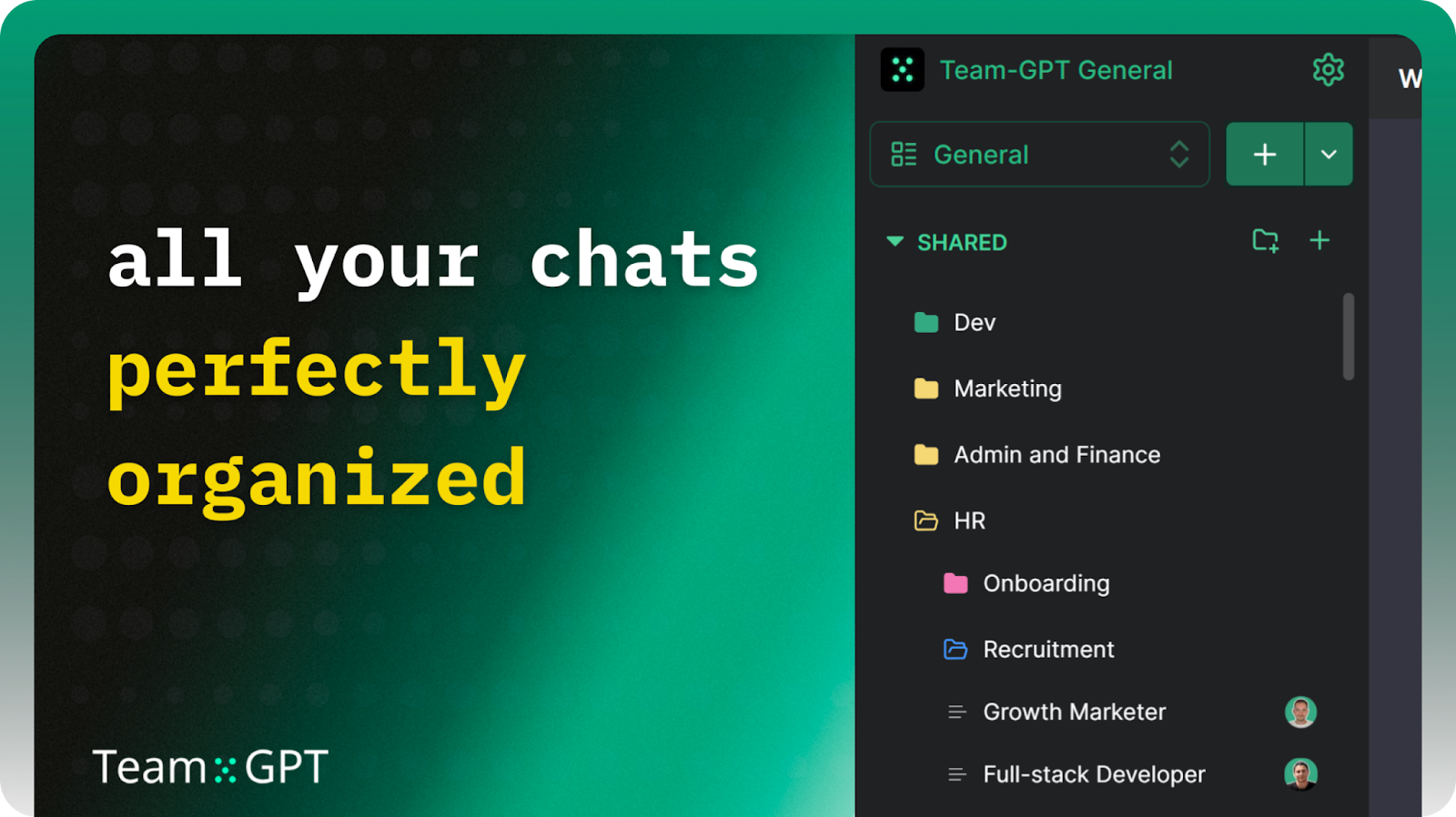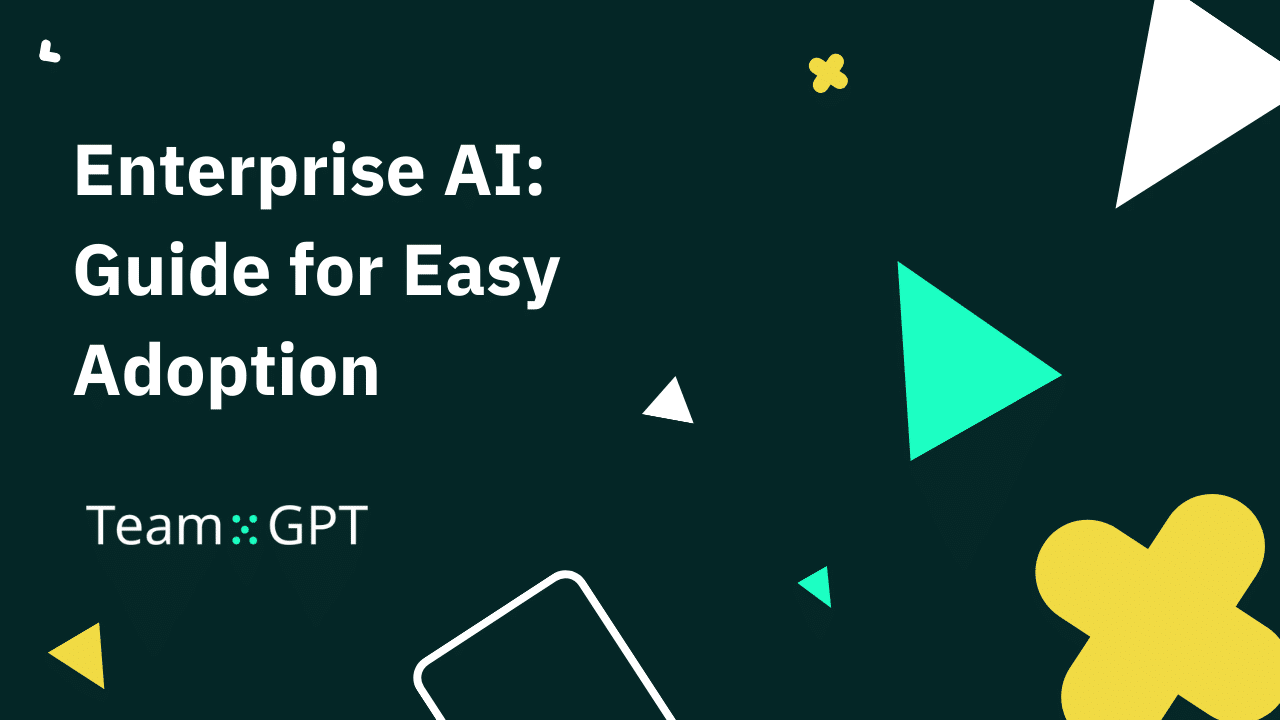Using AI as an enterprise is tough. You need a streamlined system, onboarding process, training, and so much more.
That’s why we built an enterprise AI solution – Team-GPT. It's a tool that lets you and your team adopt AI the right way.
In this article, we will talk about enterprise AI, what it is, why companies should invest in it, and the challenges to overcome.
What is Enterprise AI?
Enterprise AI refers to the application and adoption of artificial intelligence across large teams. The primary goal of AI for enterprises is to aid them in achieving key business objectives.
Due to massive data assets, large teams, and extensive operations, enterprises must use AI to save time, streamline business operations, and make data-driven decisions.
These solutions often integrate with your already existing tech stack and make them better.
At its core, enterprise AI is AI software tools that leverage cutting-edge methodologies, including machine learning models, deep learning, natural language processing (NLP), and computer vision.
These technologies empower organizations to achieve process automation in various use cases, streamline intricate business functions, automate repetitive tasks, and make the most of the data they accumulate.
Why do Enterprise Companies Need to Invest in AI?
1. AI Aids in Better Decision Making
The primary reason why companies must invest in AI is decision-making.
Let me explain why:
One of the most expensive processes in any company, no matter the industry, is the decision-making process.
If you’re the founder or even a manager in your company, you might make good decisions, but further down the employee hierarchy, the decision-making skills start declining (quality-wise).
In such cases, if you leverage AI and present the case to it for advice and guidance, chances are, AI will give you much better advice than a decision any fresher employee would make.
AI won’t make decisions for you, of course, but it will give you great ideas on how to approach a situation that normal people wouldn’t even think about.
Train your employees to adopt AI wherever they want to make a decision. Just ask them to go to ChatGPT, explain the context to AI, and ask it for suggestions. It can be as simple as listing the pros and cons of a specific situation or giving ten different ideas to tackle a problem.
2. Automating Repetitive Tasks
You can train AI to handle high volumes and repetitive tasks like data entry, document review, invoicing, etc. This will allow you to reduce manual efforts and increase overall productivity.
For example, you can leverage an AI assistant to extract data from documents and automatically input it into the company database.
Another use case of AI is using them as chatbots or virtual agents. You should deploy AI-powered chatbots to handle common customer queries, route requests to the right team, and resolve simple issues.
3. Finding Patterns in Data
AI excels at finding patterns in large volumes of data that would be tough for humans to identify manually. Use these data patterns to optimize business processes, predict future trends, personalize customer experiences, and make better business decisions.
What are the Challenges of Investing in AI?
1. Security Concerns
Adopting AI requires addressing some serious cybersecurity concerns at scale. When you feed data to AI, it interacts with confidential data like purchase history, customer identity, etc. Any breach due to network flaws or misconfigurations can lead to data leaks.
When such a data breach happens, you need to spend a lot of time and resources to rectify the problem as soon as possible and ensure none of the data is misused.
2. Making AI Adoption Easy for the Entire Team
AI adoption is challenging because it requires your team to learn new skills, and not everyone is open to change.
Another concern in AI adoption is finding a tool that lets your team adopt AI in an interesting way. It must have an intuitive interface, use cases that are tailored to your needs, and an easy learning curve.
3. Skilled Talent Shortage
In recent years, the AI industry has grown exponentially, leading to a shortage of talent.
AI and ML require specialized knowledge like expertise in complex algorithms, data analysis, programming, and domain-specific knowledge.
This level of specialization is not yet common, and it will take time for such talent to rise.
How Enterprise Companies Can Adopt AI?
Here’s what we think your AI adoption strategy should look like 👇
Step 1. The Pyramid of GPT Knowledge
The pyramid of GPT is hierarchical and has three levels:
- Fundament: Build a strong fundament, and it will hold the pyramid. You can learn this in our ‘ChatGPT for Work: The Interactive Course.’
- Relevance and Specificity: The fundament is generic. How do you make the learning relevant and specific to your industry and employees? Think about it.
- Mastery: This is when GPT is seamlessly integrated into the minds of all your employees, and they finally adopt AI.

Step 2. Have Multiple Conversations with the AI
Let’s face it: having just one conversation with AI won’t give you the perfect output. If that were the case, AI’s adoption rate would be through the roof! But that’s not the case. Only 35% of the businesses worldwide currently use AI.
You need to spend some time with AI and have conversations back and forth to reach the ‘aha’ moment.
Here’s where our platform – Team-GPT comes into play. With our inbuilt course, we teach you how to have conversations with AI for any use case you want and build your fundamentals.

Step 3. Have an In-House GPT Evangelist
We think every company must have an employee (aka. Evangelist) who is ‘really excited’ to adopt AI in business.
You, as a founder, must find at least one person in your organization who is passionate about using AI to increase your company’s efficiency.
Provide them with the right knowledge about AI and ChatGPT. Once the Evangelist knows how to use AI for your organization, ask them to educate and train other employees to use AI.
Team-GPT can help your Evangelist train other employees on AI adoption.
With Team-GPT, you can onboard different teams in your organizations and have conversations with AI. You can organize these conversations in folders, save prompts, leverage our prompt library, and do much more.

The job of the GPT evangelist will be to bring domain expertise to the software. He/she must be the one creating prompts specific to your industry for AI to answer and help optimize them over time.
Once you follow these three steps, you will reach the top of the Pyramid of GPT knowledge and achieve Mastery.
Onboard Your Whole Team with Team-GPT
Adopting AI with Team-GPT is quick and easy. With it, you can onboard multiple departments from your organization and train them on how to use ChatGPT the right way.
The tool is built to teach teams about AI and make its adoption easy.
Here are some of the features you get with it:
- Customize chats, arrange them in folders and subfolders, and reduce clutter.
- The tool offers trail-and-tested conversation starters and 100+ ready-to-use prompt templates.
- Gives you insights into the team’s AI adoption and keeps the work environment competitive by showing you the ranking of top users.
And much more.
Ready to use Team-GPT for your enterprise? Book a call with us and learn about a wide range of applications you can use AI for your enterprise.


